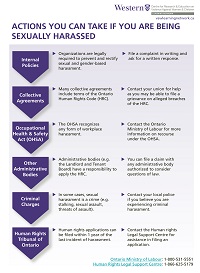Actions You Can Take if You Are Being Sexually Harassed (2016)

This infographic provides information on actions that victims of sexual harassment can take in receiving support for sexual and gender-based harassment.
View Infographic(PDF)
View Infographic(Image)
View Plain Text PDF
Internal Policies:
- Organizations are legally required to prevent and rectify sexual and gender-based harassment.
- File a complaint in writing and ask for a written response.
Collective Agreements:
- Many collective agreements include terms of the Ontario Human Rights Code (HRC).
- Contact your union for help as you may be able to file a grievance on alleged breaches of the HRC.
Occupational Health and Safety Act (OHSA):
- The OHSA recognizes any form of workplace harassment.
- Contact the Ontario Ministry of Labour for more information on recourse under the OHSA.
Other Administrative Bodies:
- Administrative bodies (e.g. the Landlord and Tenant Board) have a responsibility to apply the HRC.
- You can file a claim with any administrative body authorised to consider questions of law.
Criminal Charges:
- In some cases, sexual harassment is a crime (e.g. stalking, sexual assault, threat of assault).
- Contact your local police if you believe you are experiencing criminal harassment.
Human Rights Tribunal of Ontario:
- Human rights applications can be filed within 1 year of the last incident of harassment.
- Contact the Human rights Legal Support Centre for assistance in filling an application.
Ontario Ministry of Labour: 1-800-531-5551
Human Rights Legal Support Centre: 1-866-625-5179
This infographic emerged from Issue-Based Newsletter 13: Sexual and Gender-based Harassment.
This collection of Learning Network resources is designed to synthesize and disseminate knowledge on topics related to Gender-Based Violence (GBV). These resources provide foundational GBV knowledge including commonly used language, important gaps and emerging issues, recent research, and important educational tools and resources.
All original materials produced by the Learning Network are open-access and can be re-used and re-distributed as long as there is proper recognition of the author and/or Learning Network.
All our resources are open-access and can be shared (e.g., linked, downloaded and sent) or cited with credit. If you would like to adapt and/or edit, translate, or embed/upload our content on your website/training materials (e.g., Webinar video), please email us at gbvln@uwo.ca so that we can work together to do so.






